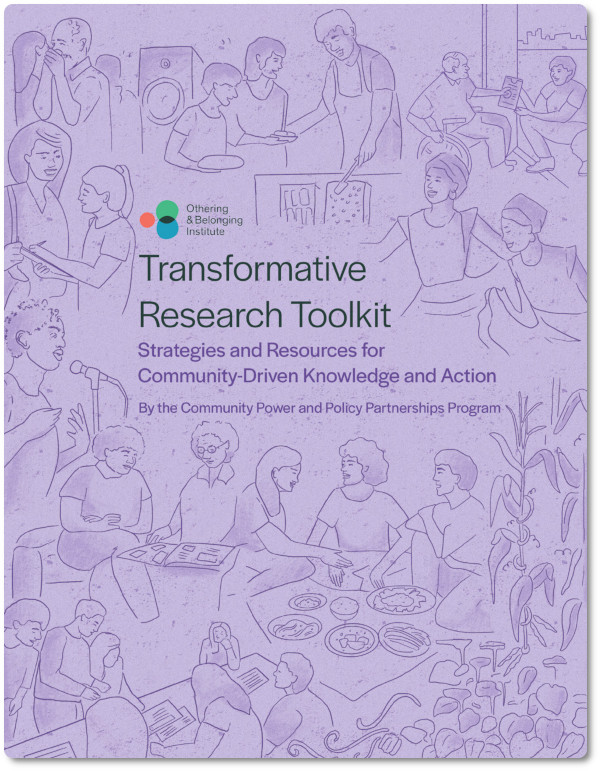[Resource] Transformative Research Toolkit

Transformative Research Toolkit
We have seen and participated in transformative research strategies that defeated proposed jail expansions, won millions of dollars for community-prioritized programs, and built new community-led organizations that changed a political landscape, among many other achievements.
Download PDF.
This transformative research toolkit refers to a wide range of processes where people center their lived experience and visions for social transformation, lead a process that systematically builds on this knowledge through investigation and learning rooted in their own ways of knowing, and take action to influence public narratives, policies, and power dynamics. In a nutshell, transformative research is any research process that positively transforms the people directly involved, the communities they are part of, and the structures shaping their lives.
There are various names and frameworks used to describe similar work, which we discuss more fully in the third section, Principles and Frameworks for Transformative Research. When research is reclaimed and redesigned to put community knowledge and collective liberation at the center, it looks different in each place and time. Here we pull together underlying principles, practices, processes, and examples that can help guide new efforts.
This toolkit is intended for cultural workers, organizers, and community leaders. It is designed to support change strategies that involve participatory action research, community organizing, cultural strategy, popular education, or other processes that center local community knowledge. We call it a “toolkit” because its contents are meant to be used to aid individuals’ and communities' work to transform public policy and systems, build power, and shift public narratives. Different tools within will be more useful and better suited to your needs at different times and for different sociopolitical contexts.
We created this toolkit over the last several years as a slow-cook process that boils down experience we’ve had over a couple decades. Many of the toolkit sections were initially created to fill partner requests around research or were generated from discussion about the role of research (positive and negative) in communities. This toolkit is not an evaluation of the specific projects we engaged in over the years, nor does this toolkit speak for those organizations and artists. These offerings are from our experiences and analyses and reflect our perspectives. We share them humbly, knowing you surely have your own to add in. We hope you’ll consider this toolkit as a bag of seeds to contemplate, choose, plant, and cultivate as they best feed you.
Overview
In Part 1, we get into the ideas; in Part 2, we offer more in-depth resources for how to carry out a transformative research process.
Part 1: Understanding Transformative Research
The reasons to be skeptical of anything called “research” are plentiful; what has been done in the name of “research” has and continues to cause countless harms. In the first section, Reclaiming Research, we name the harm that’s been done and offer a list of questions to facilitate conversations on the harm of research. The section then turns to concepts and questions for centering community knowledge and building on people’s own ways of surviving and thriving.
In the second section, Cultural Strategy and Transformative Research, we turn to collaboration with artists and cultural practitioners that broadens ways of knowing to include the knowledge generated through creative and cultural practices. We outline how weaving in cultural strategy strengthens the reach, resonance, rigor, and regenerative potential of transformative research and may also require a shift in the role of the artist.
In the third section, Principles and Frameworks for Transformative Research, we include several principles and frameworks adapted from other practitioners and some of our own. These are core concepts for thinking about an overall research process and situating it in your communities’ values, context, and goals.
Part 2: Tools for Doing Transformative Research
In the fourth section, Planning Your Research Process, we break down the research process into six phases and describe the decisions, resources, questions, and tips you may want to consider in each phase. This can be used to develop your work plan for a transformative research process, which will include the roles, relationships, planning, and activities you will carry out.
The final section of the toolkit, Research Methods, is a deep dive into eight empirical methods for generating knowledge as part of a transformative research process: power analysis, interviews, focus groups and structured discussion, surveys, policy analysis, mapping and spatial analysis, archival research, and ancestral ceremonies. For each method, we give an example of what it can look like, how it’s done, what type of knowledge it can generate, how you can build relationships and people power, what roles and resources are needed, and how cultural strategy can be woven into the process.
-
By
Othering and Belonging Institute Berkeley
-
Published
Apr 10, 2024
-
Subject Area
- Age-friendly Communities
- Information, Referral, & Advocacy
- Organizational Development
- Seniors’ Planning & Action Tables/Committees
- Non-profit / Charitable Sector Development
-
Audience
- Caregivers, Seniors & Volunteers
- Academics
- Funders
- Government (Politicians, Policy Makers) and Health Authorities
- Service Providers (Non-profits, Community Organizations, Local government)
- Government
- Health Authorities
-
Category
- Best Practices
- Advocacy
- Policy, Planning, & Procedures
- Research & Evidence
- Impact Stories

